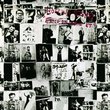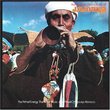| All Artists: Brian Jones Title: Pipes of Pan at Jajouka Members Wishing: 0 Total Copies: 0 Label: Polygram Records Release Date: 3/19/1996 Album Type: Limited Edition Genres: International Music, Rock, Classical Style: Africa Number of Discs: 2 SwapaCD Credits: 2 UPC: 028944661224 |
Search - Brian Jones :: Pipes of Pan at Jajouka
 | Brian Jones Pipes of Pan at Jajouka Genres: International Music, Rock, Classical
Brian Jones's trip to Morocco in 1968 included a trip to the mountain village of Jajouka guided by painter Brion Gysin. What he recorded there introduced the world at large to the Master Musicians of Jajouka, initially rel... more » |
CD DetailsSynopsis
Amazon.com Brian Jones's trip to Morocco in 1968 included a trip to the mountain village of Jajouka guided by painter Brion Gysin. What he recorded there introduced the world at large to the Master Musicians of Jajouka, initially released in 1971. Their music is based on ritual, but is still playful. The horns, chanting, and drums of this field recording are completely trancelike. It's a shame that phasing and panning has been added to the sound in an attempt to make it even more psychedelic because it stands perfectly well by itself without the effects. (You also have to wonder whether titles like "Your Eyes Are Like a Cup of Tea" are really literal translations from Aramaic). Still, this is perfectly classic stuff, celebrating the weeklong Rites of Pan festival and offering an almost religious experience to the listener. Anyone who doubts that music has the power to transport should begin here. A classic of world music. --Chris Nickson Similar CDs
|
CD ReviewsInstant Classic Maxwell Hannibal | Newark, NJ | 03/17/2004 (5 out of 5 stars) "This is the record that started the interest in Jajouka. Since most was already said, I will just add what I think is missing from other reviews. The Jajouka village is Arabic-speaking, not Berber, and definitely not "Aramaic". Their traditions are typical of whole Morocco, which is an amalgalm of Andalusian/Arabic influence, Islam, and of course the ancient traditions of Berbers of North Africa. I think this is the best record about Jajouka since it sounds like a live recording of what could have been an eternal night. The instruments are solely ghaita (Moroccan oboe) as well as tbel and bendir percussions. Many Jajouka records have sprung after this one, some are good and some are not, but this one is a must have. If you like this music, check out other Berber records and make sure you go to Morocco to attend the various traditional music festivals throughout the year!" Take Me With You, My Beloved James L. | Virginia, United States | 02/24/2004 (5 out of 5 stars) "I don't know if Brion Gysin and Brian Jones and/or the Master Musicians of Jajouka made these recordings sound so strange on purpose, or if they just turned out that way. In any case the bizarre echo and phasing effects make this recording unlike any of the 5 or 6 other Jajouka recordings. But Bachir Attar loves it, so that's one high recommendation.This music will scare ... many people. Others will be annoyed. Other people will fall in love with it, as I did. To hear this music as it is meant to be heard, you have to give yourself over to it completely, in whatever way that is best accomplished for you. Then you will abe able to hear the relationships of the repeated patterns in the 3 or 4 musical layers. These relationships can be extraordinarily complex, but sound as beautiful as a living arabesque unfolding itself would appear to the eyes.The purpose of this music is to take you away. You can only find out where you are going if you take the journey." "Nothing is true, everything is permitted" M. Bromberg | Atlanta, GA United States | 03/09/2004 (5 out of 5 stars) "Hassan i Sabbah's phrase, as translated by Brion Gysin, makes a fitting review for this album -- just as the other reviews reveal, everyone will find something different in this strange, hypnotic music. The album is a field recording made in Morocco by Brian Jones and Brion Gysin in 1968, an edited document of ancient Lupercalia rituals dedicated to the god Pan that are hours, and sometimes days, long. (These rituals echo through every springtime rite, from Mardi Gras and Carnival to Easter.) Although the recording has been given a psychedelic gloss it doesn't really need, the result is powerful music, if the listener is open to it. This is an old, old trip -- and the album, originally released in 1971, is considered the first of its kind."
|

 Track Listings (6) - Disc #1
Track Listings (6) - Disc #1

